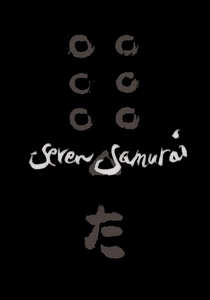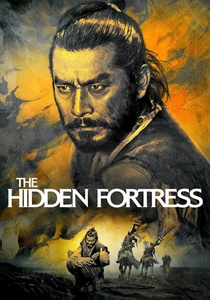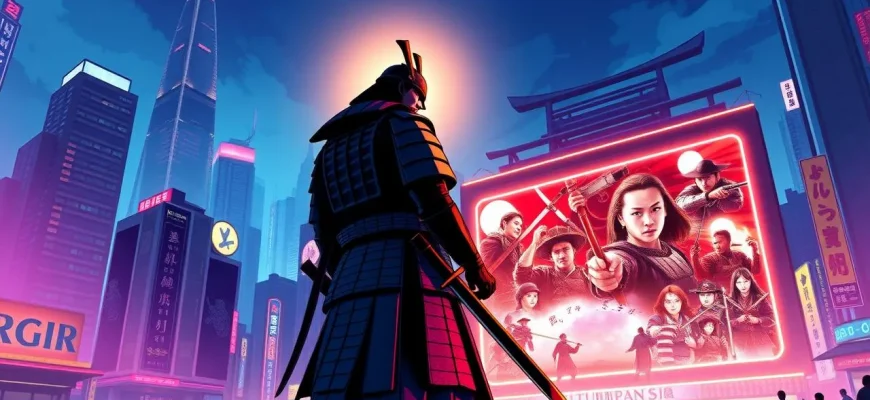This curated list of ten cult samurai films offers a deep dive into the world of Japanese cinema, where the samurai ethos is explored through epic tales of honour, revenge, and the clash of swords. These films not only provide a visual feast of meticulously choreographed action but also delve into the philosophical and cultural aspects of the samurai way of life, making them invaluable for both cinephiles and those interested in Japanese history and culture.

Seven Samurai (1954)
Description: Akira Kurosawa's masterpiece, this film set the standard for samurai epics, influencing countless filmmakers worldwide. It's a tale of a village hiring seven ronin to protect them from bandits, exploring themes of duty, sacrifice, and the samurai code.
Fact: The film was originally over four hours long, and it was Kurosawa's first film to be shot in the widescreen format.
 Watch Now
Watch Now

The Hidden Fortress (1958)
Description: This film, also by Kurosawa, tells the story of two peasants who help a general and a princess escape enemy territory. It's notable for its influence on George Lucas's "Star Wars."
Fact: George Lucas has acknowledged that the film inspired the narrative structure of "Star Wars."
 Watch Now
Watch Now

Yojimbo (1961)
Description: Another Kurosawa classic, Yojimbo features Toshiro Mifune as a wandering samurai who manipulates two rival gangs in a small town. Its influence can be seen in films like Sergio Leone's "A Fistful of Dollars."
Fact: The film was remade as a Western, "A Fistful of Dollars," without Kurosawa's permission, leading to a lawsuit that was settled out of court.
 Watch Now
Watch Now

Harakiri (1962)
Description: Directed by Masaki Kobayashi, this film is a powerful critique of the samurai code, focusing on a ronin who challenges the corrupt practices of a feudal lord's house.
Fact: The film was remade in 2011 by Takashi Miike as "Hara-Kiri: Death of a Samurai."
 30 Days Free
30 Days Free

Samurai Rebellion (1967)
Description: A tale of rebellion against a feudal lord's tyranny, this film by Masaki Kobayashi showcases the clash between personal honor and societal duty.
Fact: The film was entered into the 1967 Cannes Film Festival.
 30 Days Free
30 Days Free

The Sword of Doom (1966)
Description: This film, directed by Kihachi Okamoto, presents a dark, nihilistic view of the samurai, focusing on a master swordsman whose skill leads to his moral downfall.
Fact: The film was intended to be the first part of a trilogy, but the other parts were never completed.
 30 Days Free
30 Days Free

Samurai Assassin (1965)
Description: Based on a true story, this film by Kihachi Okamoto portrays the plot to assassinate a corrupt shogunate official, highlighting the samurai's struggle with loyalty and justice.
Fact: The film was inspired by the real-life assassination of Ii Naosuke, a key figure in the Bakumatsu period.
 30 Days Free
30 Days Free

13 Assassins (2010)
Description: A remake of a 1963 film, this Takashi Miike's version is a thrilling tale of thirteen samurai plotting to assassinate a sadistic lord.
Fact: The film features an epic 45-minute battle sequence, one of the longest in cinema history.
 30 Days Free
30 Days Free

The Twilight Samurai (2002)
Description: Yoji Yamada's film offers a more intimate look at the life of a low-ranking samurai, focusing on his personal struggles and quiet heroism.
Fact: The film won the Japanese Academy Award for Best Picture.
 30 Days Free
30 Days Free

Zatoichi (2003)
Description: Directed by Takeshi Kitano, this film brings the legendary blind swordsman Zatoichi to life with a blend of action, comedy, and dance sequences.
Fact: Kitano's version includes a unique tap dance sequence performed by the townspeople during the climax.
 30 Days Free
30 Days Free









